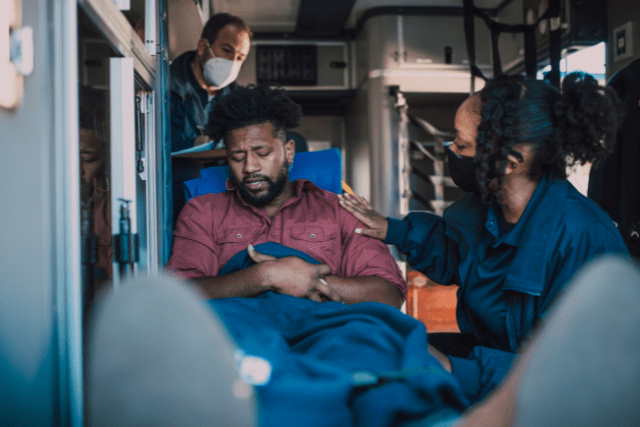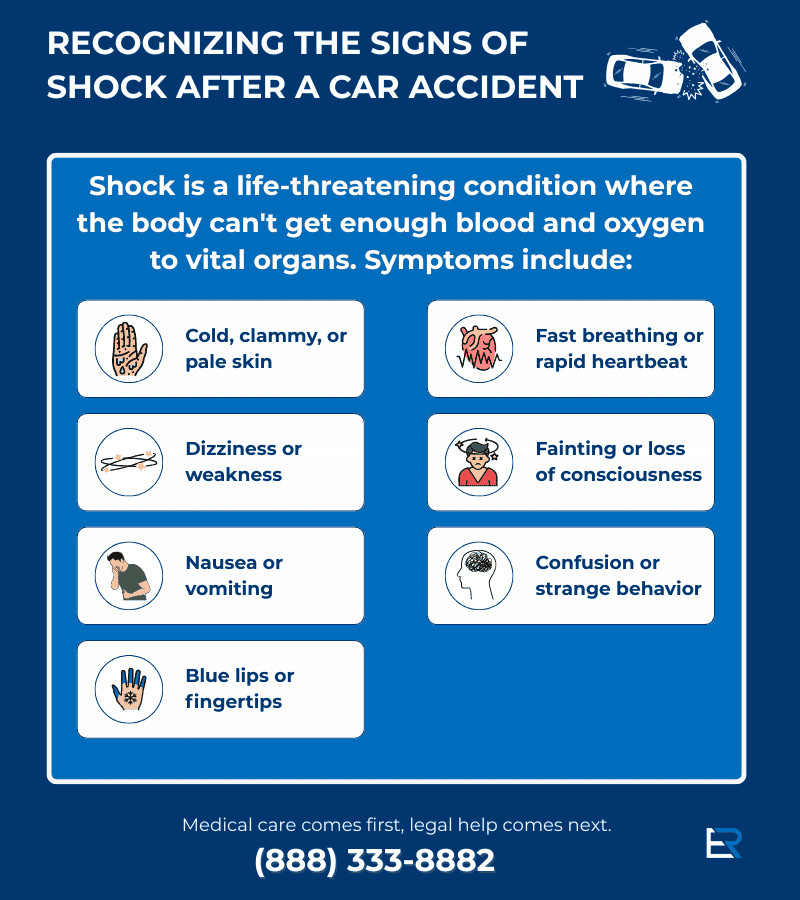Many people assume that if they’re able to walk away from a crash, they’re fine, but that’s not always true. Shock is a serious condition that often happens after a traumatic event like a car accident. It can significantly affect your breathing, blood pressure, and mental state. Knowing the signs of shock after a car accident can help you take the symptoms seriously and seek medical attention before the condition becomes life-threatening.
What Is Shock After a Car Accident?

Shock occurs when the body is unable to deliver enough blood or oxygen to vital organs. In the aftermath of a crash, this can result from severe injuries that impact circulation or damage internal systems. If left untreated, shock can quickly progress to organ failure and become life-threatening, making early detection and treatment critical.
Several types of shock may result from a crash, depending on the nature of the injuries:
- Hypovolemic shock – Caused by severe blood loss from internal injuries, deep wounds, or trauma that reduces blood volume and lowers blood pressure.
- Cardiogenic shock – Occurs when the heart is too damaged to pump blood effectively, which can happen after blunt force trauma to the chest or due to an existing heart condition worsened by the crash.
- Obstructive shock – Results from a physical blockage that prevents blood from circulating properly, such as a collapsed lung (tension pneumothorax) or pressure around the heart (cardiac tamponade).
- Anaphylactic shock – A sudden and severe allergic reaction, which can occur in rare cases due to exposure to medications, latex, or other allergens during emergency treatment.
- Septic shock – Caused by a widespread infection that enters the bloodstream, sometimes due to untreated open wounds or post-surgical complications after accident-related injuries.
- Neurogenic shock – Happens when damage to the spinal cord or nervous system disrupts the body’s ability to regulate blood pressure, often linked to head or spine injuries sustained in the crash.
Shock after a car accident is always a medical emergency. Receiving immediate medical attention not only helps protect your health, but it also helps document your injuries if you choose to file a personal injury claim. Recognizing the symptoms and acting quickly can make all the difference.
Signs of Shock You Shouldn’t Ignore
Shock is your body’s way of reacting to extreme stress or injury, but it doesn’t always look the same in every person. Some signs are easy to spot, while others take time to show. The following are key symptoms that may indicate shock after a crash.
Immediate Symptoms of Shock:
- Cold, clammy, or pale skin
- Fast breathing or rapid heartbeat
- Dizziness or weakness
- Confusion or strange behavior
- Nausea or vomiting
- Blue lips or fingertips
- Fainting or loss of consciousness
Long-Term or Delayed Signs of Shock:
- Trouble sleeping or frequent nightmares
- Anxiety, panic attacks, or fear of driving
- Feeling numb or emotionally distant
- Fatigue that doesn’t go away
- Mood swings or depression
- Flashbacks or symptoms of post-traumatic stress disorder (PTSD)
Some victims don’t realize they’re in psychological shock until days later. These emotional effects are just as real as physical symptoms, and both need proper treatment.
Recommended Reading: Recognizing Fibromyalgia After Car Accident Trauma

How Long Do the Symptoms of Shock Last?
The duration of shock depends on the type of shock, the severity of the injuries, and how quickly the person receives medical treatment. Hypovolemic shock, caused by blood loss, may improve within hours if treated promptly, while cardiogenic shock, which involves damage to the heart, often requires more intensive care and longer recovery time. Obstructive and neurogenic shock can also take time to resolve, depending on the extent of the physical injury or spinal damage. Anaphylactic and septic shock may lead to long-term complications if not addressed early, especially if they affect major organs.
Some physical symptoms of shock may go away within days, but emotional effects, such as anxiety, panic, or post-traumatic stress disorder (PTSD), can last for weeks or months. Support from mental health professionals is often needed to manage these symptoms. That’s why it’s important to track how long the symptoms of shock last and to speak with both a medical provider and a car accident lawyer about your situation. Doing so can help protect your health and your right to compensation.
What Does Treatment for Shock Look Like?
Shock treatment should begin immediately, often at the scene of the crash. First responders may provide oxygen, IV fluids, or medications to restore blood flow and stabilize vital signs. Depending on the type of shock, hospital treatment may include surgery for internal bleeding (hypovolemic shock), medications to support heart function (cardiogenic shock), antibiotics for infection (septic shock), or epinephrine to stop a severe allergic reaction (anaphylactic shock). Obstructive shock may require procedures to remove blockages around the heart or lungs, and neurogenic shock might involve monitoring and treating spinal injuries.
Emotional trauma caused by the accident may also lead to psychological symptoms. These are commonly treated through counseling, therapy, and sometimes medication. Whether you’re dealing with a physical injury or the lasting effects of emotional trauma, getting proper medical care is essential, not only for your recovery but also for documenting your condition in a personal injury claim.
Can You File a Personal Injury Claim for Shock?
If you experienced shock as a result of a car accident caused by someone else, you may have the right to pursue a personal injury claim. Compensation may be available for both the physical effects of trauma and the emotional impact, such as anxiety or psychological distress.
Compensation may cover the following:
- Hospital and emergency room expenses
- Ongoing medical treatment
- Mental health counseling or therapy
- Lost income because of time away from work
- Pain, suffering, and emotional distress
How Our Car Accident Attorneys Help Victims of Shock
Dealing with an insurance company while you’re trying to recover is never easy, especially when you’re also coping with delayed shock or trauma. Insurance adjusters may not fully understand or acknowledge the seriousness of your condition. That’s why partnering with an experienced personal injury law firm like El Dabe Ritter Trial Lawyers can make all the difference in your recovery and your case.
At El Dabe Ritter Trial Lawyers, we will:
- Thoroughly investigate your auto accident and gather key evidence
- Collaborate with your doctors to document both physical and emotional symptoms of shock
- Handle all communication and negotiations with the insurance company
- Make sure every aspect of your claim is accounted for, including emotional trauma and mental health impacts.
Our legal team understands how shock can lead to long-term complications, both medically and financially. We fight for the maximum compensation you deserve, so you can focus on your health, your family, and your future.
Don’t Overlook the Signs of Shock After a Car Accident

If you or someone you love is showing signs of shock after a car accident, getting medical care is the most important first step. But once you’re safe, it’s just as important to protect your legal rights. Shock, whether physical or psychological, can lead to lasting complications, and insurance companies may try to downplay its impact.
Our experienced personal injury team understands how serious these cases are. Contact us today for a free consultation, and let us help you get the support and compensation you deserve.
Disclaimer: The information provided in this blog post is not intended as legal advice and should not be relied upon as such. You should consult with an experienced attorney for advice on your specific situation.
